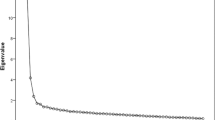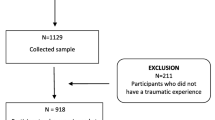Abstract
Objective: There is information about the impact of disasters and trauma on children, but little is known about the effects of terrorism particularly in India. (i) To assess the knowledge of the 9/11 terrorist attacks to the school going adolescents of India who were miles away from the actual incident. (ii) To compare the reactions to this event among the boys and girls.Methods: The study used a survey design with a self—report questionnaire administered to 406 students in 6 schools of standards 9–12. The questionnaire was administered within 3 weeks of occurrence of this event. The mean age of the subjects was 16.34 years (SD=1.22; range=13–20) and 44.1% were boys.Results: All the students were aware about this event. Awareness that the twin towers were hit was in 81.06 but only 51.94% knew that Pentagon was also hit. All the children knew who the prime suspect was although only 12.62% were aware about the country to which he belonged. The source of knowledge of the events was the television in 74.7% of the adolescents and 17.95% of them viewed foreign news channels additionally to the Indian channels to gather details about the event. Newspaper, radio and internet were the sources of information in 44.17%, 3.4% and 3.5% children respectively. Of the adolescents who gathered information from the television, 84.7% agreed that there had been an increase in their TV viewing time since the event and it was more than one hour per day in 47.5% of them. None of the students supported the terrorist attacks. The number of students with negative stressors was significantly more than the ones who were unaffected (p≤0.0001). The girls were significantly more affected than the boys and while the former expressed anger the latter were more fearful and sad. (p≤0.05) The idea of USA going for war against Afghanistan was supported by 69.4% and one third of them believed that such an event might adversely affect India. The adolescents who had witnessed the events on television were more fearful and shocked than the ones who read about the event in the print media (p≤0.05).Conclusion: This study emphasizes the adverse reactions in the minds of adolescents in India to terrorist events even though they did not directly witness the events of September 11,2001. The role of media exposure in causing stress is also revealed. Pediatricians should be aware of the adverse effects of terrorism in the minds of the children and should be able to identify and help those who are in need.
Similar content being viewed by others
References
Williams AD. September 11,2001: the day the world changed. Available at:http://www.september11news.com/DailyTimeline.htm. Accessed September, 2003.
Barringer F, Fabrikant G. As an attack unfolds, a struggle to provide vivid images to homes.New York Times; September, 2001; 12: A25.
Ford CA, Udry JR, Gleiter K, Chantala K. Reactions of young adults to September 11, 2001.Arch Pediatr Adolesc Med 2003; 157: 572–578.
Terr LC, Bloch DA, Michel BA, Shi H, Reinhardt JA, Metayer SA. Children's symptoms in the wake of Challenger: a field study of distant traumatic effects and an outline of related conditions.Am J Psychiatry 1999; 156: 1536–1544.
Cantor J, Mares ML, Oliver MB. Parents' and children's emotional reactions to TV coverage of the Gulf War. In Greenberg BS, Gantz W, eds.Desert Storm and the Mass Media. Cresskill NJ, Hampton Press, 1993; 325–340.
Pfefferbaum B. The impact of the Oklahoma City bombing on children in the community.Mil Med 2001; 166: 49–50.
Pfefferbaum B, Nixon SJ, Krug RSet al. Clinical needs assessment of middle and high school students following the 1995 Oklahoma City bombing.Am J Psychiatry 1999; 156: 1069–1074.
Pfefferbaum B, Seale TW, McDonald NBet al. Posttraumatic stress two years after the Oklahoma City bombing in youth geographically distant from the explosion.Psychiatry 2000; 63: 358–370.
Pfefferbaum B, Seale TW, Brandt EN Jr, Pfefferbaum RL, Doughty DE, Rainwater SM. Media exposure in children one hundred miles from a terrorist bombing.Ann Clin Psychiatry 2003; 15:1–8.
Duggal HS, Berezkin G, John V. PTSD and TV viewing of the World Trade Center (letter).J Am Acad Child Adolesc Psychiatry 2002; 41: 494.
Hayez JY. Our children, the Twin Towers and the war.Arch Pediatr 2001; 8: 1297–1301.
DeLisi LE, Maurizio A, Yost M, Papparozzi CF, Fulchino C, Katz CLet al. A survey of New Yorkers after the Sept. 11, 2001, terrorist attacks.Am J Psychiatry 2003; 160: 780–783.
Schuster MA, Stein BD, Jaycox L, Collins RL, Marshall GN, Elliott MNet al. A national survey of stress reactions after the September 11, 2001 terrorist attacks.N Engl J Med 2001; 345: 1507–1512.
Chen H, Chung H, Chen T, Fang L, Chen JP. The emotional distress in a community after the terrorist attack on the World Trade Center.Community Ment Health J 2003; 39: 157–165.
Hoven CW, Duarte CS, Mandell DJ. Children's mental health after disasters: the impact of the World Trade Center attack.Curr Psychiatry Rep 2003; 5: 101–107.
Murphy RT, Wismar K, Freeman K. Stress symptoms among African-American college students after the September 11, 2001 terrorist attacks.J Nerv Ment Dis 2003; 191: 108–114.
Irwin Redlener, Roy Grant. The 9/11 terror attacks: Emotional consequences persist for children.Contemporary Pediatr 2002; 9: 43.
Apolone G, Mosconi P, La Vecchia C. Post traumatic stress disorder (letter).N Engl J Med 2002; 346: 1495.
Pfefferbaum B, Pfefferbaum RL, Gurwitch RH, Nagumalli S, Brandt EN, Robertson MJet al. Children's response to terrorism: a critical review of the literature.Curr Psychiatry Rep 2003; 5: 95–100.
Silver RC, Holman EA, Mc. Intosh DN, Poulin M, Gil Rivas V. Nation wide longitudinal study of psychological responses to September 11.JAMA 2002; 288: 1235–1244.
Dixon P, Rehling G, Shiwach R. Peripheral victims of the Herald of Free Enterprise disaster.Br J Med Psychol 1993; 66: 193–202.
Fact Sheet; Helping Children and Adolescents Cope with Violence and Disasters. National Institute of Mental Health, Department of Health and Human Services, September 2001, NIH Publication No. 01-3518.
Pfefferbaum B, Nixon SJ, Tivis RDet al. Television exposure in children after a terrorist incident.Psychiatry 2001; 64: 202.
Caronna EB, Augustyn M, Zuckerman B. 9/11: Teachers, television and trauma.Pediatr Academic Societies 2002, abstract 137.
Cantor J. Media violence.J Adolesc Health 2000; 27: 30–34.
How to talk to children and parents after a disaster. Washington, D.C. American Academy of Child and Adolescent Psychiatry, 1999. (Accessed September 16,2003, athttp://www.aacap.org/publications/Disaster Response/cp_disas.htm.)
AAP offers advice on communicating with children about disasters. Washington, D.C. American Academy of Pediatrics, 2001. (Accessed September 16,2003, athttp://www.aap.org/advocacy/release/disastercomm.htm.)
Laor N, Wolmer L, Spirman S, Wiener Z. Facing war, terrorism, and disaster: toward a child-oriented comprehensive emergency care systemChild Adolesc Psychiatr Clin N Am 2003; 12: 343–361.
Cassimatis EG. Terrorism, our world and our way of life.J Am Acad Psychoanal 2002; 30: 531–543.
Blaschke GS, Lynch J. Terrorism: its impact on primary pediatrics, Part III.Pediatr Ann 2003; 32:216–217.
Author information
Authors and Affiliations
Rights and permissions
About this article
Cite this article
Ray, M., Malhi, P. Reactions of Indian adolescents to the 9/11 terrorist attacks. Indian J Pediatr 72, 217–221 (2005). https://doi.org/10.1007/BF02859259
Published:
Issue Date:
DOI: https://doi.org/10.1007/BF02859259




